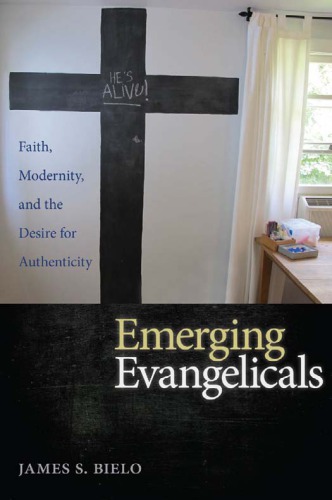

Most ebook files are in PDF format, so you can easily read them using various software such as Foxit Reader or directly on the Google Chrome browser.
Some ebook files are released by publishers in other formats such as .awz, .mobi, .epub, .fb2, etc. You may need to install specific software to read these formats on mobile/PC, such as Calibre.
Please read the tutorial at this link: https://ebookbell.com/faq
We offer FREE conversion to the popular formats you request; however, this may take some time. Therefore, right after payment, please email us, and we will try to provide the service as quickly as possible.
For some exceptional file formats or broken links (if any), please refrain from opening any disputes. Instead, email us first, and we will try to assist within a maximum of 6 hours.
EbookBell Team

0.0
0 reviewsThe Emerging Church movement developed in the mid-1990s among primarily white, urban, middle-class pastors and laity who were disenchanted with America's conservative Evangelical sub-culture. It is a response to the increasing divide between conservative Evangelicals and concerned critics who strongly oppose what they consider overly slick, corporate, and consumerist versions of faith. A core feature of their response is a challenge to traditional congregational models, often focusing on new church plants and creating networks of related house churches.Drawing on three years of ethnographic fieldwork, James S. Bielo explores the impact of the Emerging Church movement on American Evangelicals. He combines ethnographic analysis with discussions of the movement's history, discursive contours, defining practices, cultural logics, and contentious interactions with conservative Evangelical critics to rethink the boundaries of Evangelical as a category. Ultimately, Bielo makes a novel contribution to our understanding of the important changes at work among American Protestants, and illuminates how Emerging Evangelicals interact with the cultural conditions of modernity, late modernity, and visions of postmodern Christianity.
The Emerging Church movement developed in the mid-1990s among primarily white, urban, middle-class pastors and laity who were disenchanted with America's conservative Evangelical sub-culture. It is a response to the increasing divide between conservative Evangelicals and concerned critics who strongly oppose what they consider overly slick, corporate, and consumerist versions of faith. A core feature of their response is a challenge to traditional congregational models, often focusing on new church plants and creating networks of related house churches.Drawing on three years of ethnographic fieldwork, James S. Bielo explores the impact of the Emerging Church movement on American Evangelicals. He combines ethnographic analysis with discussions of the movement's history, discursive contours, defining practices, cultural logics, and contentious interactions with conservative Evangelical critics to rethink the boundaries of Evangelical as a category. Ultimately, Bielo makes a novel contribution to our understanding of the important changes at work among American Protestants, and illuminates how Emerging Evangelicals interact with the cultural conditions of modernity, late modernity, and visions of postmodern Christianity.